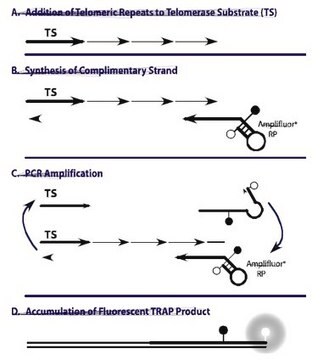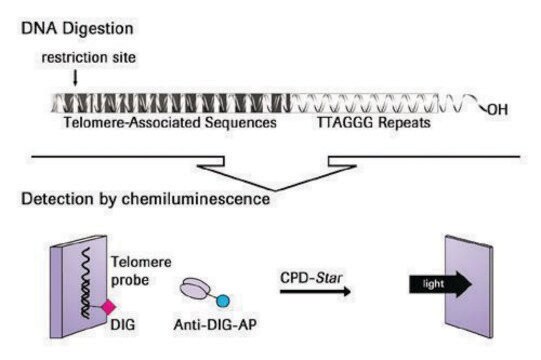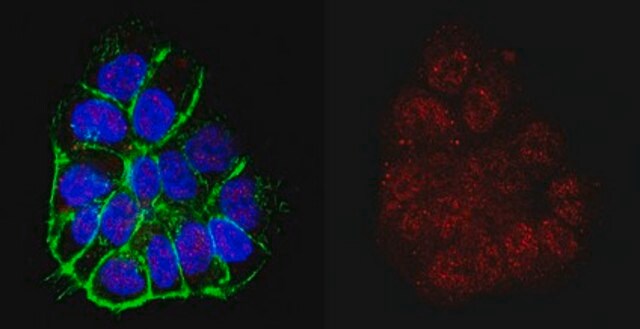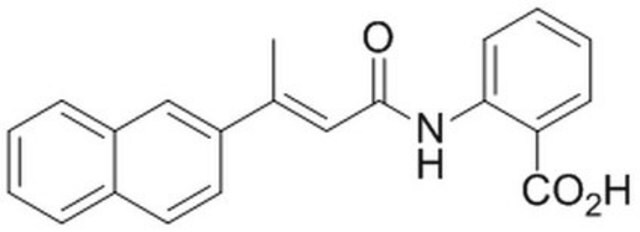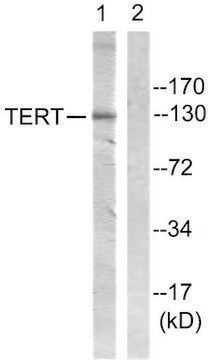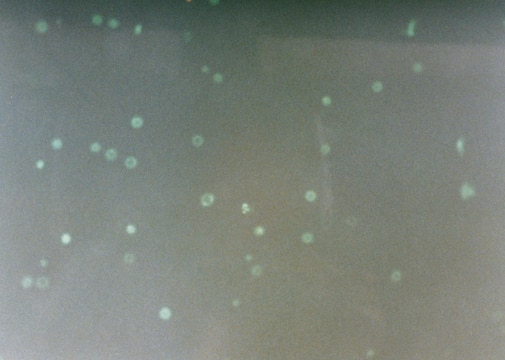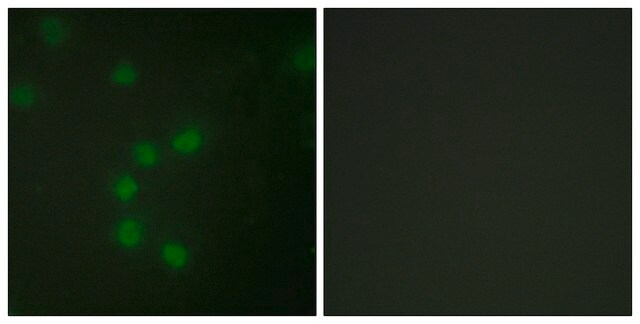S7701-M
TRAPeze™Telomerase Positive Control Cell Pellet
This product is intended for use with the components of the TRAPEZE Telomerase Detection Kit, the TRAPEZE XL Telomerase Detection Kit & the TRAPEZE ELISA Telomerase Detection Kit.
Zaloguj sięWyświetlanie cen organizacyjnych i kontraktowych
About This Item
Kod UNSPSC:
41116012
eCl@ss:
32160405
NACRES:
NA.84
Polecane produkty
Poziom jakości
producent / nazwa handlowa
Chemicon®
Opis ogólny
This product is intended for use with the components of the TRAPEZE™ Telomerase Detection Kit (Catalog # S7700), the TRAPEZE XL Telomerase Detection Kit (Catalog # S7707) and the TRAPEZE ELISA Telomerase Detection Kit (Catalog # S7750). Recommended Taq polymerases: must be non-proofreading, having no exonuclease activity and capable of "hot-start." Titanium Taq, Platinum Taq are suggested.
Material Provided
Each vial of S7701 TRAPEZE Positive Control Cell Pellet contains one million cells, pelletted to the bottom of the microcentrifuge tube.
Material Provided
Each vial of S7701 TRAPEZE Positive Control Cell Pellet contains one million cells, pelletted to the bottom of the microcentrifuge tube.
Zastosowanie
Instructions for Use
1. Resuspend the cell pellet in 200 μl of 1X CHAPS Lysis Buffer.
2. Incubate the suspension on ice for 30 minutes.
3. Spin the sample in a microcentrifuge at 12,000 X g for 20 minutes at 4°C.
4. Transfer 160 μl of the supernatant into a fresh tube.
5. Aliquot and quick-freeze the remaining extract on dry ice, and store at -75°C to -85°C. The extracts for the TRAP assay should be quick-frozen on dry ice after each use. Aliquots should not be freeze-thawed more than 5 times to avoid loss of telomerase activity. Additionally, aliquoting reduces the risk of contamination.
6. Use 1000 cell equivalents (2 μl of a 1:10 dilution) per TRAP assay, according to the kit manuals.
1. Resuspend the cell pellet in 200 μl of 1X CHAPS Lysis Buffer.
2. Incubate the suspension on ice for 30 minutes.
3. Spin the sample in a microcentrifuge at 12,000 X g for 20 minutes at 4°C.
4. Transfer 160 μl of the supernatant into a fresh tube.
5. Aliquot and quick-freeze the remaining extract on dry ice, and store at -75°C to -85°C. The extracts for the TRAP assay should be quick-frozen on dry ice after each use. Aliquots should not be freeze-thawed more than 5 times to avoid loss of telomerase activity. Additionally, aliquoting reduces the risk of contamination.
6. Use 1000 cell equivalents (2 μl of a 1:10 dilution) per TRAP assay, according to the kit manuals.
Research Category
All
All
This product is intended for use with the components of the TRAPEZE Telomerase Detection Kit, the TRAPEZE XL Telomerase Detection Kit & the TRAPEZE ELISA Telomerase Detection Kit.
Opakowanie
1x10(e6) cells
Przechowywanie i stabilność
Must be stored at -75°C to -85°C. Telomerase in specimens stored as a cell pellet is stable at this temperature for several years. Once the cell extract is made (in 1X CHAPS Lysis Buffer), it is stable for 1 year, if not subjected to more than 5 freeze-thaw cycles
Informacje prawne
CHEMICON is a registered trademark of Merck KGaA, Darmstadt, Germany
TRAPEZE is a trademark of Merck KGaA, Darmstadt, Germany
Oświadczenie o zrzeczeniu się odpowiedzialności
Unless otherwise stated in our catalog or other company documentation accompanying the product(s), our products are intended for research use only and are not to be used for any other purpose, which includes but is not limited to, unauthorized commercial uses, in vitro diagnostic uses, ex vivo or in vivo therapeutic uses or any type of consumption or application to humans or animals.
Ta strona może zawierać tekst przetłumaczony maszynowo.
Kod klasy składowania
12 - Non Combustible Liquids
Klasa zagrożenia wodnego (WGK)
WGK 2
Temperatura zapłonu (°F)
Not applicable
Temperatura zapłonu (°C)
Not applicable
Certyfikaty analizy (CoA)
Poszukaj Certyfikaty analizy (CoA), wpisując numer partii/serii produktów. Numery serii i partii można znaleźć na etykiecie produktu po słowach „seria” lub „partia”.
Masz już ten produkt?
Dokumenty związane z niedawno zakupionymi produktami zostały zamieszczone w Bibliotece dokumentów.
A M Zahler et al.
Nature, 350(6320), 718-720 (1991-04-25)
The ends or telomeres of the linear chromosomes of eukaryotes are composed of tandem repeats of short DNA sequences, one strand being rich in guanine (G strand) and the complementary strand in cytosine. Telomere synthesis involves the addition of telomeric
Nasz zespół naukowców ma doświadczenie we wszystkich obszarach badań, w tym w naukach przyrodniczych, materiałoznawstwie, syntezie chemicznej, chromatografii, analityce i wielu innych dziedzinach.
Skontaktuj się z zespołem ds. pomocy technicznej